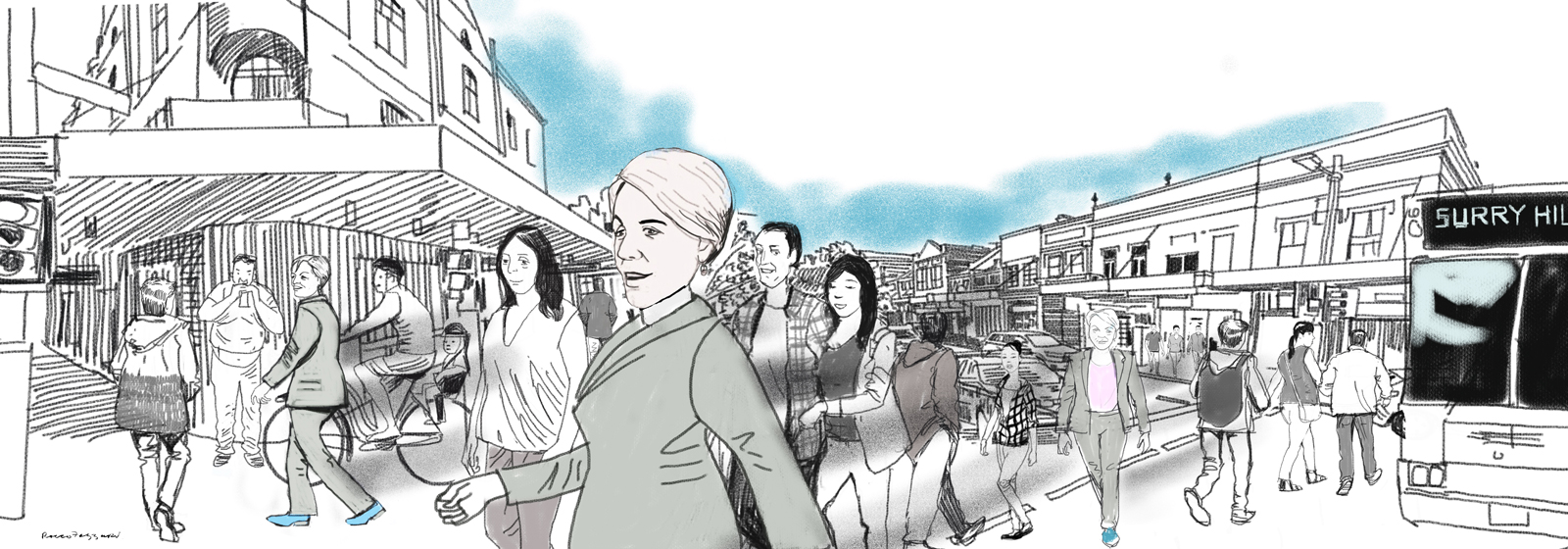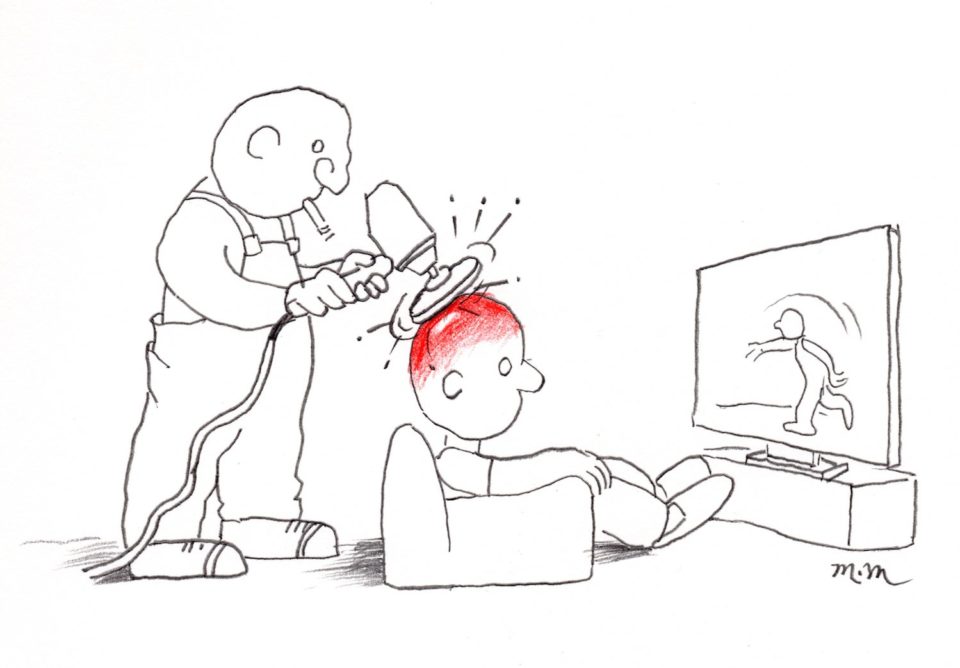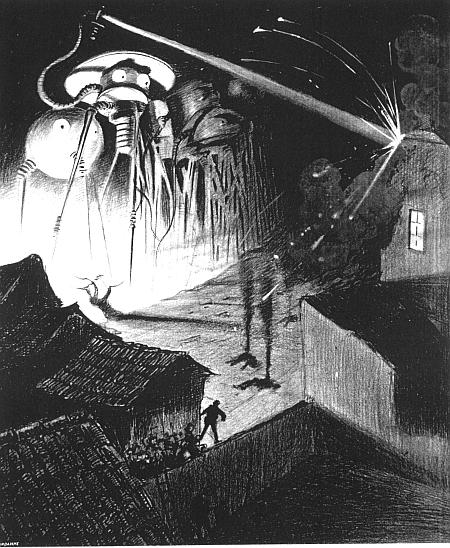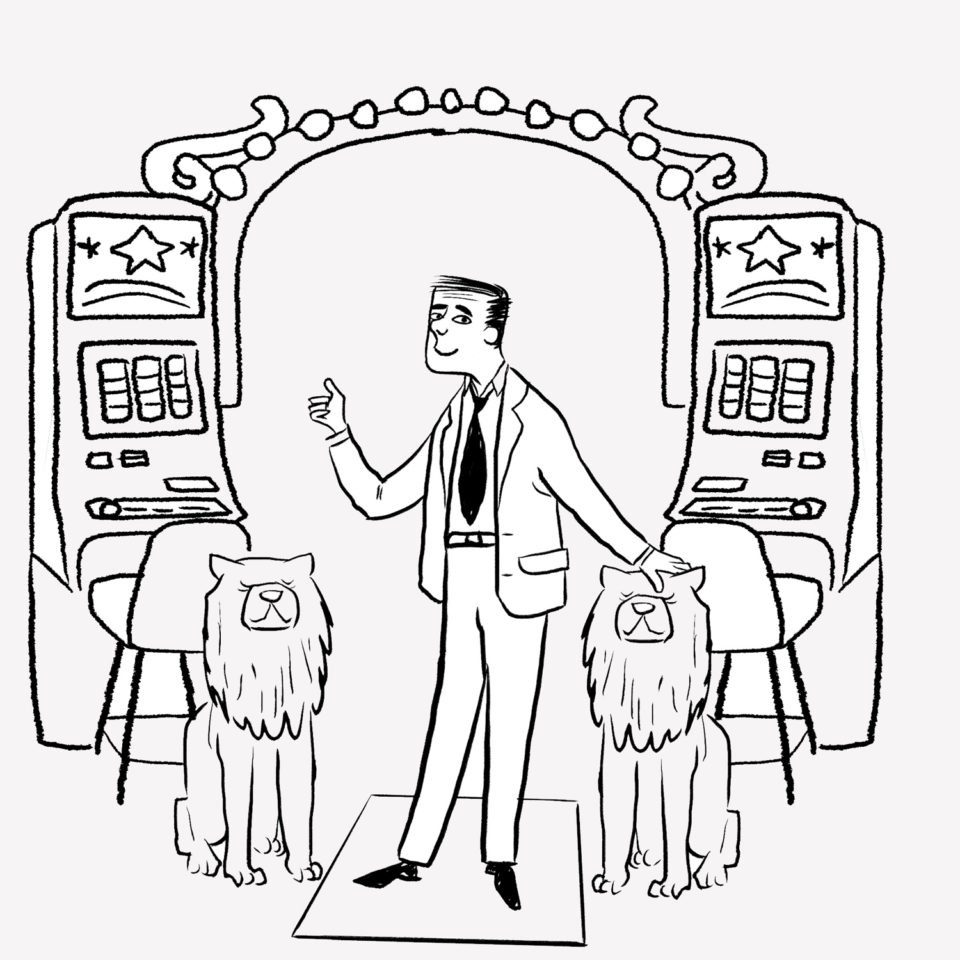Tanya Plibersek in blue suede shoes. Walking fast.
I‘m run-walking along Crown Street, Surry Hills, to keep up with her.
“What about voter disengagement in democracies?” I ask. At which point an apparently engaged voter stops dead in the street to smile at her. Plibersek flies by, flashes him a big smile back and says hello.
It’s an ironic micro-moment that plays into Plibersek’s, frankly, at times, Pollyanna-ish world view. But it doesn’t change the fact that in the 2016 federal election, Australia had its biggest no show of voters since 1922. Despite compulsory voting. More than 1.4 million eligible Australians failed to vote.
In recent elections in the US and France, millions of people declined to vote, prompting some, citing the twin shocks of Trump and Brexit, to call a collapse of faith in western democracies. “Burning down the house,” is how an American friend describes the US political scene. “Chemo for Washington,” says another.
But Plibersek, who’s been the Labor member for the federal seat of Sydney since 1998, is reluctant to accept that global pessimism about democracy affects Australia.
“I’m not seeing it,” she says. It’s possible there’s a spring in her step due to the Federal Labor leader Bill Shorten being at the top of the morning news. He’s reported as having “changed the rhetoric” on tax reform. Optimism is in the air and Plibersek won’t have it otherwise on this sunny Sydney Friday.
Only in a follow up phone conversation, a couple of weeks later, when I push the point further does she grudgingly concede that Australia is potentially subject to the forces that brought about Brexit and Trump. And that the number of Australians not turning up to vote in elections is concerning. But it’s not a discussion she livens to. And she crafts her words to dampen, not inflame it.
“I don’t think we’re immune to the Trump and Brexit response – that people are worried about politics-as-usual and they want to see some change. But I certainly don’t think we’ve got the same sense of cynicism and disaffection that you see in some other countries,” she says.
And here I sense her conundrum in an environment where the political classes in general have had voters, coaxed by simplistic media, rolling their eyes and tuning out. How, when the polls for Labor are so favourable (though not for Shorten as preferred Prime Minister), to be a credible alternative government without trash-talking the nation’s political establishment of which Plibersek and her party are undeniably a part?
Plibersek tells me she holds regular meet and greet opportunities with constituents that attract up to 200 people each time. “People are very engaged,” she insists. Watch her in jeans, unflanked by minders, in one-on-one conversations with shoppers at the Kings Cross market on a Saturday and it’s hard to disagree with her view that Australian democracy is not broken.
Plibersek won two thirds of the two candidate preferred vote at the 2016 federal poll, resisting an ambitious push from the Greens. The second time we speak, I suggest that Plibersek’s electorate may be more engaged than many, causing a disconnect between her perception of voter engagement and the overall reality.
She counters: “I engage with a lot of young people who are politically active and very politically committed and they do a lot of their activism online. And they are encouraging a lot of other young people to get involved in the kind of world they want to live in.”
Yet, as even Plibersek knows, it ain’t all roses. Her narrative is one that focuses in on a couple of big headline problems then quickly gets to solutions: Trust us, we can fix it is the subtext.
“We have in Australia, the highest rates of inequality we’ve seen for 75 years. We’ve seen stagnant wages growth. But despite those two things, we’re still not as bad as the United States. We haven’t seen the massive destruction of the middle and working classes in Australia that we’ve seen in the US. But if we don’t address inequality in this country, we will be. So, a big part of the answer is to make sure ordinary people working hard all day get a decent day’s pay. And that we have some security in our industrial relations system so that people are not just relying on the gig economy in the way that the world is increasingly trending. Because I think that does drive feelings of insecurity that are not good for our society, our economy or our democracy.”
But she rejects the anti-economic-globalisation rhetoric espoused by international leaders on both sides of politics, including the UK Labour leader Jeremy Corbyn and the US President Donald Trump. “I just don’t think it’s as simple as that. The idea that globalisation is bad is not how the Labor Party sees it. Australia is a trading nation and we rely on exporting our goods and increasingly our services to the rest of the world and that’s a good thing. [But] the benefits of our prosperity need to be shared with the people who are creating the wealth and that’s the working people of Australia.”
When we first meet, Plibersek, the daughter of migrant Slovenian farmers, greets me wearing a navy suit at her Surry Hills office. She worries I must be cold sitting near the sensor doors that flick open and shut. She offers me a cup of tea to warm me up. Standing in what’s arguably the most citified seat in Australia, and despite the corporate suit, there’s something kind-of-country about Plibersek. And I suspect that’s a plus.
I ask her how the population-dense inner metropolitan seat of Sydney, which covers 44 square kilometres of the city’s prime land and iconic sights, has changed since she won it. “The big change is that people used to move out to the suburbs when they had their second child. But that’s happening less. People are used to living in smaller spaces as they have their family.”
It’s a change that resulted in generational tension recently when a skate park for teenagers proposed for Rushcutters Bay was nixed at Woollahra Council following a backlash from locals supported by the Prime Minister, Malcolm Turnbull. The site in question is in Turnbull’s Wentworth electorate but it’s also close to many of Plibersek’s constituents. Writing as the Member for Wentworth, Turnbull argued that “hard surfaces and concrete structures” were not sympathetic to how the Rushcutters Bay park was currently used. (Disclosure: I signed a petition opposing the skate park, which later, once better informed, I regretted.)
Plibersek, a mother of three who is married to high flying NSW public servant Michael Coutts-Trotter, was incensed by the snub to the politically idealistic teenagers who lobbied Woollahra Council for the skate park.
“I was disappointed in the Prime Minister. I couldn’t understand why he would get involved in denying young people an opportunity to get outside and exercise. Yet he can’t manage to rouse himself to oppose the sell-off of the [Sydney] GPO and any of these other huge issues that affect our common heritage.”
She says we should want our teenagers to maintain an active lifestyle. “Instead, we keep saying: ‘You’re not allowed in the shopping centres because people are frightened of you. [Or] in the park because we don’t like the skateboards or the scooters’ – and then we criticise them for being addicted to their devices.”
Still, I point out to Plibersek: there are a lot of old timers in our area who walk in Rushcutters Bay Park to get their exercise and who may fear the noise and speed of skateboarding teenagers. “You can negotiate on the things that would make it more pleasant for people of all ages,” says Plibersek.
“I suppose there are moments when there is a bit of tension. But people live in the city because they love diversity. It’s a more human city when you see people from all stages of life living together.”
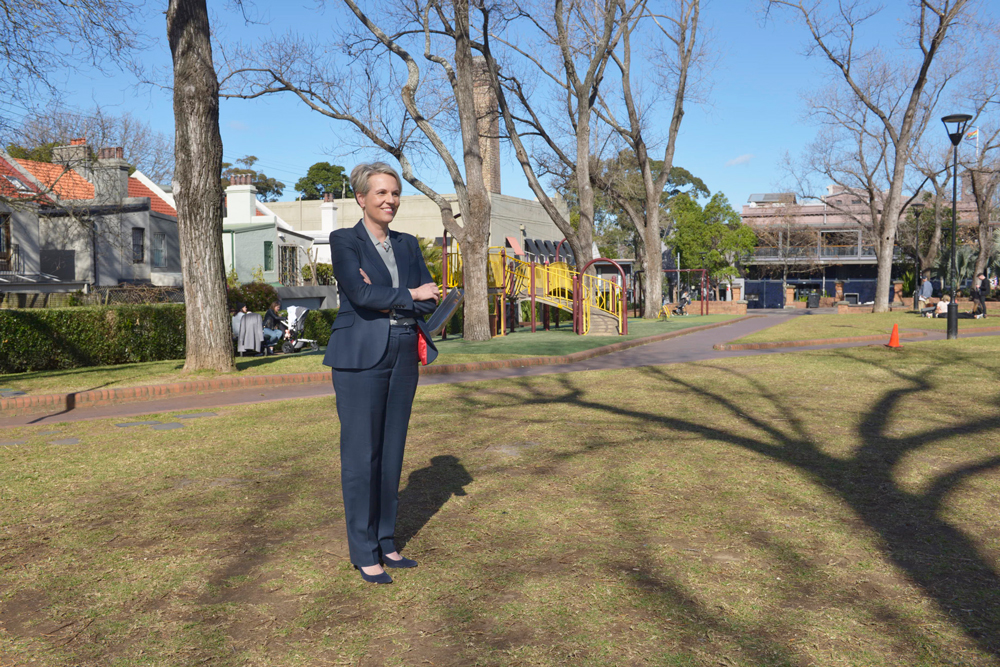
Tanya Plibersek in Surry Hills, Sydney. Photography by Andrew Cowen
Plibersek speaks of her older brothers, Ray and Phillip, often. They were her protectors, guides and mentors who’d occasionally sneak her into a pub gig when she was underage in the days when you still could. That Phillip was tragically murdered in 1997 is unspoken this day. He was the one who first told her she was smart and had a responsibility to do something useful.
That her brothers got Plibersek hooked on the music of Nick Cave early seems prophetic in light of the grief that would come. She seems to feel a sisterly warmth for the broody punk prince whose Murder Ballads and ‘The Ship Song’ she loves.
At school, she says: “All my friends were listening to KISS and Abba and I was listening to great Australian bands like The Triffids and the Go-Betweens.” Did that make her the cool one? I ask. “No, I was the loser,” she emphasizes. “Everyone else would be playing Abba and I’d be…” She stops mid-sentence to say she’s not being “snooty”. She likes Abba too, has them on her Spotify.
All that was before she was elected to Parliament. She is now Deputy Leader of the Opposition and Deputy Leader of the Australian Labor Party. It’s a Labor Party still overcoming the scars of its last self-harming years in office – but now emboldened by the Coalition incumbents falling into the same traps of disunity that destroyed the Rudd and Gillard governments.
You don’t have to Google deeply to find speculation about Plibersek having the potential to become Australia’s second female prime minister. I joke to her about a friend’s fantasy of sipping champagne and listening to Nick Cave with her if she ever does get the top job. “It’d be peppermint tea. But you’re on the right track with the music,” she says.
It turns out we both went to see Cave perform at the International Convention Centre in Sydney early this year. “It’s such a big venue. But Nick Cave has the ability to make every person there feel like the show is just for them. And I also felt really sad for him because not so long ago he lost his son.”
Just then the compassionate nurturer gives way to the feminist and change agent in Plibersek as she rails against the paucity of women’s toilets at the venue. She led a rebellion to “just go into the men’s with a bunch of other women” but they were stopped by security guards.
Things amp up when Plibersek gets going on “the absolute monstrosity that is WestConnex that will disgorge (she later uses the word ‘vomit’) an extra 60,000 cars into the southern part of my electorate.” Plibersek says people bought apartments in Alexandria and Erskineville, having been told by successive state governments they wanted these areas to be less car-reliant.
She gets a lot of feedback about stress in the inner city – more people, more cars, traffic gridlock. “Most people who live in the inner city are OK with density as long as the amenity is good. But you can’t keep putting more people into a city and telling them they shouldn’t be using cars but then not improving the public transport.”
Her media advisor Dan Doran tells me there’s only time for a couple more questions. I ask Plibersek her favourite place in her electorate. “I love walking from the Boy Charlton Pool through the Botanic Gardens past Lady Macquarie’s chair.” But there’s a second favourite: Lord Howe Island, in some historic quirk, is also part of the electorate of Sydney. Its mail goes through the Sydney GPO. She’s been there about ten times – three for work but the rest for family holidays “obviously paid for myself”. She describes Lord Howe Island as “peerless”, adding “It’s like the 1950s, no mobile phone service, no internet to the house. You really relax. People talk to each other.”
Warming to the simple things is a big part of Plibersek, who loves road trips with the family. Recently she introduced Carly Simon’s 1970s hit song, ‘You’re So Vain’, to her three children, Anna, Joseph and Louis.
“When we go on road trips together we take turns playing songs. They love that song.” Six-year-old Louis Coutts-Trotter had his own interpretation of the line: I had some dreams, they were clouds in my coffee. He thought ‘clouds’ were ‘clowns’. “So, now we all sing, clowns in my coffee,” says Plibersek, enjoying the family talk.
It’s only well after we meet that I realise 2017 is a big anniversary for Plibersek. It marks 20 years since the official beginning of her political career – her preselection for the seat of Sydney. That this happened just a few weeks after her brother Phillip died is a matter of indescribably painful timing. On the threshold of that career defining achievement, she was suddenly in the funk of grief. Somehow, she stepped forward.
Two decades have passed since then and Plibersek, now a prominent and well-seasoned career politician, is briskly pacing towards another federal election. It’s due on or before 19 May, 2019. There are, she says, stark differences between the Coalition and Labor: trickle-down economics for the former and addressing inequality for the latter.
“I don’t know whether you characterise those as Right and Left affiliations. But they are certainly very important differences. And I think most people know, more or less, which side they are on.”



